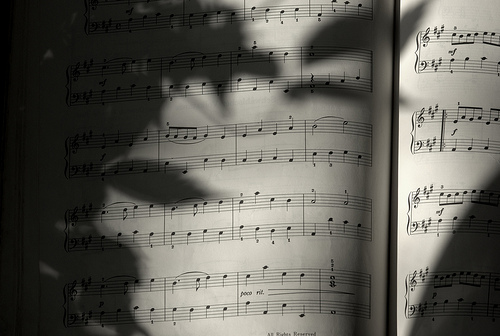Which music theory text is right for you will depend a lot on where you are in your musical studies and what kind of music you like to play. Whether you’re a complete newcomer to the idea of theory, a self-taught performer hoping to gain a deeper understanding of the craft, or a professional musician looking to fill gaps in your knowledge, one of the tomes on the list below will be a perfect fit for you. They’re the 4 best music theory books on the market.
Alfred’s Essentials of Music Theory
Alfred’s Essentials is designed to be a self-guided music course that will teach you everything you need to know about basic music theory. Whether you’re a high school student preparing for a major in music or you’re a hobbyist hoping to expand your knowledge, this book will get you up to speed on all the basics in language that makes it easy to understand.
The included ear training CD will teach you to recognize notes, chords, and intervals, especially helpful skills for improvising musicians who want to be able to replicate on their instrument the lines they’re hearing in their head. The included self-assessments will help you test your knowledge along the way. This is easily among the best music theory books out there.
Hal Leonard Pocket Music Theory
If you’d rather get your music theory knowledge on the go, this pocket guide from Hal Leonard gives you all the knowledge you need about music theory in book small enough to carry with you in your gig bag. This book is designed to be a resource for performers, and is written with that point of view in mind, packed with practical knowledge about everything from basic scales and rhythms to more advanced concepts like harmonization and modulation.
Going through the book cover to cover gives you a thorough introduction to the core concepts of music theory, in a logical sequence and with exercises to help you reinforce the concepts along the way. You can also use it as a reference book, and it includes many handy charts of keys, chords, and tempos that can be helpful for musicians of all genres and levels to have in their proverbial back pocket.
The Jazz Theory Book
While the basics of harmony and rhythm are the same regardless of what genre you play in, when it comes to the specific chords and scales, jazz theory can be very different from classical theory. If you’re a rock or jazz musician who wants to get deeper into the theory behind good improvisation, Mark Levine’s The Jazz Theory Book is the go-to source to get you up to speed.
Suitable for both intermediate and advanced players, it gives you thorough explanations of important harmonic and rhythm concepts in language that’s easy to understand. Don’t expect to go through this one too quickly; there’s enough material here to fill a college course, and you’ll want to spend some time exploring the concepts with your instrument in your hand to really get the most out of the lessons.
Alfred’s Adult All-in-One Course
If you’re an absolute beginner, the books above might seem intimidating, and do often assume at least a passing familiarity with music performance, if not necessarily with the terminology or details specific to the theory. This All-In-One course from Alfred’s Basic, on the other hand, is suitable for the musician who has never taken a music lesson.
It is designed to be used with an instrument, typically a piano, though it can be adapted to any instrument easily enough. While the original Alfred’s Basic course is intended for use with a piano instructor, this expanded course can be used either with an instructor or on your own as a resource for self-study. This is among the best music theory books period.
Ear Training
The term ear training refers to a musician’s ability to identify and notate aspects of music that you hear. This is not the same thing as perfect pitch, which is the ability to identify a specific note simply by hearing it; that skill is often in-born, but ear training can be taught, and is an important part of most music college curriculums.
Ear training is a valuable skill for musicians of all stripes and genres. It helps you tune better—both with yourself and the rest of the band—and makes it much easier to self-assess issues with your technique. It is an especially important skill for jazz, rock, and other improvising musicians. Being able to correctly hear the chords being played can be a great help if you ever get lost in the changes. Good ear training also makes it easier to play the melodic solo lines you’re hearing in your head and allows you to construct more complex lines that span across chord changes. With enough practice, you’ll be able to identify the lines your bandmates play, making you a more collaborative musician.
If you’ve never studied ear training, the best music theory book should therefore come with a CD, like Alfred’s Essentials book (see full specs). It can be intimidating to start trying to train your ear using pre-recorded solos or on the fly during rehearsals and jam sessions. A good ear-training course will start you off with something simpler, like identifying intervals, slowly working you up to hearing stacked chords and harmonies. As with most things in music, frequent and attentive practice is the key.
Many musicians who are self-taught learned by ear and have already developed strong ear training skills; for them, the challenge is in figuring out the written notation and understanding the why behind what sounds good and what doesn’t. A less expensive and more compact book like the Hal Leonard (see full specs) above will be a more efficient way to get the information you need. Good luck!









Thanks Micah, I’ve been trying to up my music theory game and I was messing around with some apps but they just don’t really work for me. I was hoping to find a good repository of music theory books that someone has actually looked at before buying something random on Amazon. I appreciate the list.